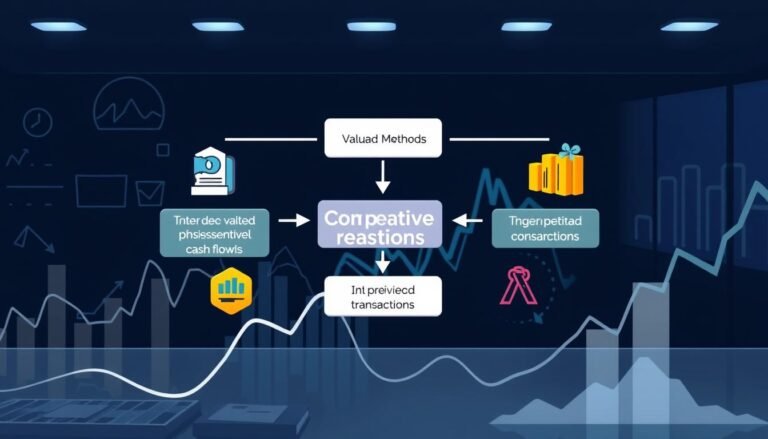Mastering Fintech: A Guide for Finance Professionals in the Digital Age
What if mastering a mix of technology and finance is key to success in today’s financial world? As a finance pro, staying up-to-date with fintech could be your edge. This guide will give you the tools to thrive in the digital age.
Fintech is changing the financial world with digital banking, blockchain, AI, and big data. By 2024, fintech is expected to grow a lot, thanks to new tech, changing consumer wants, and new rules. To lead, finance pros need to get these changes and use them in their plans.
This fintech guide covers the basics to advanced topics like blockchain and decentralized finance. It will help you stand out, keep customers, build your brand, and show your expertise. Get ready to use financial tech to grow your career.
Key Takeaways:
- The fintech industry is on the brink of significant growth in 2024 due to emerging technologies and regulatory changes.
- Understanding and integrating fintech advancements is crucial for finance professionals in the digital age.
- Key areas of focus include digital banking, blockchain, artificial intelligence, and big data analytics.
- Effective marketing strategies, such as content marketing and influencer marketing, are vital for fintech success.
- Continuous monitoring and optimization of SEO performance can enhance visibility and credibility in the fintech sector.
Introduction to Fintech
Understanding FinTech is key in today’s fast-changing finance world. Financial Technology, or FinTech, is a big change in how we get financial services. It brings new ideas, makes things more efficient, and adds convenience for people everywhere.
What Is Financial Technology (FinTech)?
FinTech is when technology meets financial services. It includes things like mobile banking, peer-to-peer lending, and even cryptocurrency. FinTech aims to make financial services better and easier to use for everyone.
A Brief History of FinTech
The FinTech journey started in the late 20th century with electronic payments and ATMs. But, the 2008 financial crisis really sparked a lot of new ideas. It showed that old banking systems needed a digital boost.
Since then, FinTech has grown fast. It’s expected to grow by almost 25 percent each year. This shows how much we rely on digital services today.
How Does FinTech Work?
FinTech uses new tech to make financial services better. It focuses on:
- Payment Processing: Digital wallets and mobile payments make paying easier and safer.
- Data Analytics: Big data helps businesses understand customers better and make smart choices.
- Blockchain Technology: This tech supports cryptocurrencies, making transactions safe and clear.
- Robo-Advisors: These tools offer financial advice without needing a human.
This mix of tech and finance shows how FinTech is changing the game. It’s leading to big improvements in how we get and use financial services.
Now, let’s look at some important stats about FinTech:
| Statistic | Details |
|---|---|
| Employment Growth | Financial analysts’ jobs are expected to grow by 8 percent from 2022 to 2032. |
| Market Growth | The global fintech market is set to grow by almost 25 percent each year. |
| FinTech Courses | For example, Northwestern’s fintech bootcamp costs $11,995 for both full-time and part-time programs. |
| Course Duration | Many part-time fintech boot camps last 24 weeks, while full-time ones last 12 weeks. |
So, Financial Technology is shaping the future of finance. It offers new solutions for a world that loves digital services. Keeping up with FinTech trends is important for both finance pros and users.
Digital Banking and Its Importance
Digital Banking has changed the way we handle money, making it easier, faster, and safer. Thanks to new tech, we can now access financial services from anywhere. This change has made our banking experience better.
The Rise of Mobile Payments
Mobile Payments are key in Digital Banking, showing how tech has changed our lives. Services like Apple Pay and Google Wallet let us pay with just a tap. They also keep our money safe with advanced security features.
A 2021 paper by BIS Papers No. 117 highlights the benefits of Digital Banking and Mobile Payments. They make transactions cheaper and improve how we share information. This shift has led to a market with both big banks and new fintech companies.
Integration of Technology and Finance
Technology and finance are now closely linked, thanks to AI, blockchain, and more. These tools are making old banking services better. For example, cloud computing makes banking safer and more efficient.
Also, banks are now offering a smooth experience across all platforms. This means you get the same service whether you’re online, using an app, or in a branch. It’s all about making things better for customers.
To succeed in the digital world, banks need a solid plan. This includes setting goals, getting support from leaders, checking current tech, and adopting new ones. This way, banks can stay ahead and offer better services to their customers.
Understanding Blockchain and Cryptocurrency
In today’s digital world, the cryptocurrency market has changed how we do financial transactions. It uses blockchain technology, which is new and exciting. This section will explain what blockchain is and look at popular cryptocurrencies that are changing finance.
What is Blockchain?
Blockchain technology started after the 2008 financial crisis. It’s a way to record transactions without a central database. Instead, it uses volunteer computers called nodes.
Each transaction is put in a block, then linked to the last block. This creates a chain. It makes transactions safe and open, thanks to complex algorithms.
Blockchain is great because it doesn’t get inflated. It’s a safe way to do money transactions. Plus, it doesn’t need middlemen, which saves money and makes things more efficient.
Popular Cryptocurrencies in the Market
The cryptocurrency market is full of life, with many digital currencies for different needs. Bitcoin is like the “gold standard” of cryptocurrencies. It can be used to buy things and as a safe place to keep money.
Ethereum is another big name. It’s not just for money; it also helps create smart contracts and apps without a middleman.
Stablecoins try to keep their value steady by linking it to real money. Tokens for specific projects, like in DeFi, show how blockchain can help create new financial products.
Cryptocurrency exchanges have grown a lot. They connect people to markets for buying and selling different cryptocurrencies. This growth has made people more confident in financial markets. It has made them safer and less prone to fraud.
The Role of Artificial Intelligence in Fintech
Artificial Intelligence (AI) is changing how we handle and use financial data.
More financial services are using AI, growing by 63%. This shows how important AI is for better work and customer service.
How AI is Transforming Finance
AI is changing old ways of doing things in finance. It uses predictive models to spot fraud and guess if customers will default. It also predicts market changes quickly, helping with fast trades.
In retail banking, AI checks if someone can borrow money better than old methods. It uses Natural Language Processing (NLP) for easier voice or text chats. This makes talking to banks and getting things done simpler.
Practical Applications of AI in Fintech
AI in fintech has many useful roles:
- Data Analysis: AI helps understand what customers think and what the market will do next. This helps make better plans and decisions.
- Process Automation: AI makes tasks like lending and checking claims faster and more accurate. About 15% of AI is used for market research, 17% for lending, and 20% for claims.
- Customer Experience: AI chatbots and virtual assistants make talking to banks better. They offer personal services, making customers happier. Younger people are more likely to use AI for their finances.
- Algorithmic Trading: AI watches trading closely and spots problems. This makes trading safer and smoother.
AI is a big step forward for fintech, making things run smoother and services better. Many leaders are using AI, and most think it will make more money in the next few years. This shows AI’s big impact on finance.
The Impact of Big Data Analytics
In the fast-changing world of financial technology, Big Data in fintech is a major game-changer. It brings big changes to the financial world. Big data analytics helps gather and analyze data better, giving insights for risk and making processes more efficient.
Data Aggregation and Analysis
The fintech industry has grown to $550 billion, showing the importance of data. Banks use Big Data to make smart decisions. For example, the World Bank says 1.7 billion adults don’t have bank accounts, making financial inclusion key.
Big data helps predict customer needs by analyzing lots of data. OCBC uses customer history to improve marketing, boosting customer happiness. Alibaba’s fraud system shows how big data fights fraud and risk.
Automation and Algorithmic Processing
Automation is key to making fintech work better. Big data helps make decisions faster, saving money and improving how resources are used. Neobanks are growing fast, showing the power of automated services.
Big data also helps manage risks by analyzing data quickly. It lets banks stay ahead of problems. Machine learning helps in stock trading, making decisions better. The growth of noncash payments highlights the need for smart systems to handle more transactions.
Peer-to-Peer Lending Platforms
Peer-to-Peer lending platforms have changed how we borrow and lend money. They use technology to connect borrowers with investors, skipping banks. This makes it simpler for people to get loans and for investors to earn more.
How P2P Lending Works
Borrowers start by applying for loans on fintech platforms. After approval, their loan is listed for investors. The platform handles the loan details, like payments and collections. Interest rates depend on the borrower’s credit and the platform’s rules.
- Borrowers apply for loans on fintech lending platforms.
- Approved applications are listed for potential investors.
- Investors can choose which loans to fund.
- The platform manages the loan’s logistics, including payments and collections.
Advantages and Risks of P2P Lending
P2P lending has many benefits but also risks. Borrowers get lower rates and quicker approvals than banks. Investors can earn more. But, there’s a risk of defaults and liquidity issues. It’s important for both sides to do their homework to avoid these risks.
“The volume resulting from the Registered Reports format helped define the field of FinTech and provided a boost in FinTech-related research submissions to finance conferences and journals.”
Knowing the P2P risks is key. By understanding both sides, people can make better choices in Peer-to-Peer lending.
RegTech and InsurTech
The world of Regulatory Technology and Insurance Technology is changing fast. This is because people want better compliance management and new ways to handle risks. RegTech and InsurTech are making the financial world more efficient and safe.
Regulatory Compliance and Risk Management
RegTech uses cloud computing, AI, machine learning, and blockchain to improve risk and compliance management. These tools help automate reports and spot fraud better. The spending on RegTech by banks is expected to jump from $10.6 billion in 2017 to $76.3 billion by 2022.
This growth shows how important RegTech is worldwide. It works in many places and industries, showing its wide use.
Cloud computing is key in RegTech. It helps with teamwork and keeps data safe.
| Technology | Role | Benefits |
|---|---|---|
| Cloud Computing | Infrastructure | Scalability, Cost-effectiveness |
| Artificial Intelligence | Process Automation | Fraud Detection, Data Analysis |
| Blockchain | Data Security | Transparency, Immutability |
InsurTech: Revolutionizing Insurance
Insurance Technology (InsurTech) is changing the insurance world. It offers new ways to serve customers, make things run smoother, and better understand risks. AI lets insurance companies create policies that fit each customer’s needs.
“The INSURTECH Book” by Susanne Chishti shows how big of a change InsurTech can make. It helps make insurance better and introduces new products for today’s needs.
InsurTech is key for keeping up with today’s fast, tech-loving world. It helps insurance companies stay quick and focus on what customers want.
RegTech and InsurTech working together is a big deal for the financial world. They both use technology to improve how things are done and to innovate.
Fintech Trends and Innovations to Look Out for
The financial world is changing fast, with new fintech trends and innovations on the horizon. From biometric security to decentralized finance (DeFi), it’s important for finance pros to stay informed.
Digital Identity and Biometrics
Digital Identity verification and biometric tech are key fintech trends. They make transactions safer and build trust in online financial services. Users can log in and make payments easily with facial, fingerprint, or voice scans.
Biometric tech boosts security and makes services easier to use. For example, M-Pesa in Kenya shows how mobile payments and strong ID can serve millions. It’s a big step towards making finance more accessible and user-friendly.
Decentralized Finance (DeFi)
Decentralized Finance (DeFi) is another major trend. It uses blockchain to cut out middlemen, lower costs, and open up finance to more people. DeFi offers smart contracts, decentralized exchanges, and yield farming, making finance more transparent and inclusive.
DeFi platforms are gaining popularity because they’re decentralized and empower users. They let people make direct transactions, borrow and lend, and earn interest without a central authority.
Looking ahead, it’s vital for finance pros to keep up with these trends. By embracing these innovations, they can meet the evolving needs of the financial world.
Key Skills for Finance Professionals in the Digital Age
The finance world is changing fast. To keep up, finance pros need fintech skills. They also need to know both tech and finance well. Getting certified is more important than ever.
Technical Proficiency and Financial Acumen
In 2024, finance pros need strong digital skills. They should know about:
- AI in finance.
- Software like Xero and QuickBooks.
- Data tools like Excel and Tableau.
- Blockchain.
They also need to be good at analyzing things. This includes critical thinking, financial modeling, and risk management. CEOs say critical thinking is key, valued by 80%.
| Soft Skills | Percentage of Professionals who Value Them |
|---|---|
| Critical Thinking | 80% |
| Networking and Negotiation | 70% |
| Adaptability | More than half |
| Experience in Fintech Startups or Tech Companies | Two-thirds |
Being adaptable and versatile is crucial. Finance pros should keep learning and stay open to new tech. More than half of fintech managers say adaptability is key.
Essential Certifications
Certifications are also vital for career growth. Getting certified as a CFP, CFA, or CPA shows you’re serious about your skills. It proves you meet high standards.
Giving finance pros the right tools and certifications is key. It’s not just about growing professionally. It’s about succeeding in the fast-changing finance world of 2024 and beyond.
Fintech Education and Training Opportunities
The fintech industry is growing fast, offering many chances for finance pros to improve their skills. With fintech training key for career growth, many learning paths are open.
World-class schools offer advanced courses and fintech training programs for all. For example, CFTE has trained over 20,000 in AI, giving a solid base in digital finance. These programs include insights from big names like Mastercard, UBS, and IBM.
But learning in fintech isn’t just about school. There are also workshops, webinars, and online courses. The FTIP™ program, for instance, has 23 courses with over 120 interactive exercises. It’s designed for all levels and has gotten over 500,000 5-star reviews.
The fintech market is set to hit $1.5 trillion by 2030, making digital finance education crucial. Big banks like JP Morgan, DBS, and HSBC are using blockchain, showing how vital fintech skills are.
Universities like Louisiana State University and Rutgers University Camden offer special fintech programs. These programs teach finance and tech skills, like data analysis and problem-solving. With fintech expected to grow by 16.8% by 2028, there’s a big demand for AI, big data, and blockchain experts.
| Job Role | Average Salary (US) | Average Salary (China) | Average Salary (India) | Average Salary (Brazil) |
|---|---|---|---|---|
| App Developer | $75,051 | ¥240,000 | ₹573,475 | R$25,800 |
| Blockchain Developer | $94,132 | ¥152,662 | ₹676,550 | R$116,747 |
Fintech courses give a wide range of skills for finance, banking, and more. These skills are key for a career in an industry that’s always innovating.
Adopting Fintech Solutions: Best Practices
In the fast-changing world of finance, using fintech can put you ahead. Following the best ways to use fintech makes things smoother and helps avoid common problems. Let’s look at the steps and how to tackle fintech challenges.
Steps to Implement Fintech in Your Organization
Effective fintech implementation needs a clear plan. Here are the main steps:
- Assess Your Needs: Do a deep analysis to find fintech that matches your goals and setup.
- Choose the Right Solution: Pick a fintech that meets your needs. Look at things like payment systems, lending, robo-advisors, and blockchain.
- Engage Stakeholders: Make sure everyone, from bosses to tech teams, knows and agrees on the benefits.
- Develop an Implementation Plan: Create a detailed plan with a timeline, resources, and how to handle risks. Assign tasks and set achievable goals.
- Test Extensively: Do pilot tests to find and fix problems before going live. This makes the transition smoother and better for users.
- Train Your Team: Offer training to help employees get used to the new system and use it well.
- Monitor and Optimize: Keep an eye on how the system works and make changes to make it better and more efficient.
By following these steps, you can make fintech adoption smooth. This ensures your company gets the most out of new finance tech.
Overcoming Common Challenges
Even with the benefits, fintech integration can be tough. Here are ways to overcome fintech challenges:
- Regulatory Compliance: Keep up with laws and make sure your fintech follows them to avoid fines.
- Data Security Concerns: Use strong security to protect financial data. Blockchain, for example, adds security and clarity.
- Integration with Legacy Systems: Integrate fintech with old systems slowly. Use APIs and modular designs for smooth transitions.
- Cost Management: Think about the long-term savings of automation and efficiency. Automated tools can cut costs and boost accuracy.
- User Adoption: Encourage a culture of innovation and offer training and support. This helps users accept and use new tech.
Dealing with these challenges needs a proactive mindset and flexibility. Use best practices in fintech to unlock fintech’s full potential. This will lead your organization towards a more efficient and innovative future.
The Future of Fintech in Financial Services
Fintech is changing financial services in big ways. It’s set to have a huge impact on banking worldwide. Finance experts need to keep up with these changes to stay ahead.
Predictions for the Next Decade
The future of fintech looks bright. By 2030, fintech could make up 25% of global banking revenue. Smartphones, with 68% of the world using them, are making mobile payments easy and popular.
Neobanks like Chime are making banking simpler for millions. Online lending is also growing fast, expected to hit $4.9 trillion by 2030. Digital payments are becoming more common, showing a big change in how we handle money.
Preparing for Future Trends
To succeed in fintech, you need the right skills. This means knowing about new tech like blockchain and AI. Keeping up with trends and learning new things is key.
Central banks are looking into digital currencies, with 60% interested. This could lead to safer digital transactions. But, it also means we need better security against cyber threats, like the $3.8 billion stolen in 2023.
By embracing these changes, finance pros can help shape the future of finance. They’ll stay relevant and competitive in the next decade.
Source Links
- GrowSurf: Referral Software for Marketing, Product, and Engineering Teams
- Mastering Fintech SEO: A Comprehensive Guide for Growth | Disrupto
- Fintech Bootcamp: A Complete Guide
- Introduction to FinTech
- Introduction to FinTech and Financial Innovation – Online Course – FutureLearn
- Fintech and the digital transformation of financial services: implications for market structure and public policy
- Digital Transformation in Banking (2025 Guide)
- Cryptocurrency & Its Impact on Fintech | A Quick Guide to Crypto
- Blockchain and Cryptocurrency Explained
- AI’s Role in Finance: Transforming the Financial Sector
- Generative AI in FinTech: Use Cases & Real-World Examples
- FinTech and Its Impact on the Finance Industry
- Big Data in Finance
- The Role of Big Data in Financial Services: Transforming the Industry
- OP-REVF190027
- FinTech and the Transformation in Financial Services
- Title: 10 Best Books That Will Expand Your Knowledge About Fintech
- Top Fintech Books You Must Read – Fintech Schweiz Digital Finance News – FintechNewsCH
- What is FinTech?
- Breaking into FinTech: Emerging Trends and Career Paths | Fairfield University
- Insightful Outlook: Top Fintech Trends on the Horizon in 2024
- Biggest Fintech Trends In 2024 | Bankrate
- Mastering the Must-Have Skills for Finance Professionals in 2024
- Top skills in Finance for 2023 – CFTE
- Online Fintech Courses & Certifications – CFTE
- FinTech Industry Professional (FTIP™) Certification
- What Is Fintech? A Guide to Fintech Courses and Careers
- Understanding The World of Financial Technology (FinTech)
- How Can Fintech Help Small Businesses Succeed?
- Integrating FinTech Solutions and Online Marketing: Enhancing Customer Engagement and ROI | ProfileTree
- What Is the Future of Fintech?
- FinTech








